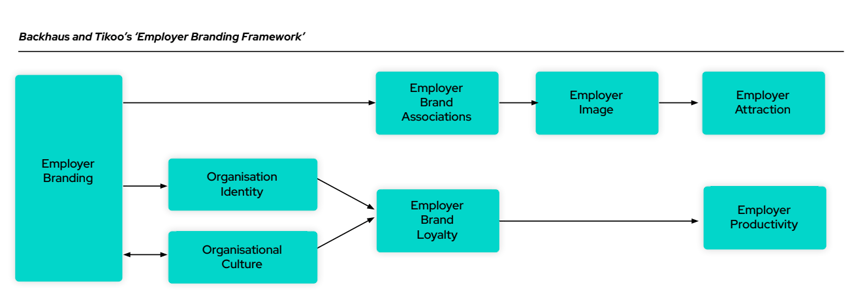The benefits of crafting a distinctive, sought-after employer brand can’t be overlooked - especially in today’s era of tough competition and high employee expectations.
But, how do you make sure your brand truly stands out from the crowd? Without just paying mere lip service to the concept of employer branding? It’s a challenge many HR leaders struggle to move beyond, having to navigate between platforms like Glassdoor and greater post-pandemic employee demands.
This is where psychology comes in, via the ‘psychological contract’ and social identity theory.
The hidden power of a psychological contract
Research by Backhaus and Tikoo, ‘Conceptualizing and Researching Employer Branding’, explores the concept of the ‘psychological contract’. That is, a contract between an employee and employer that occurs during the recruitment process. 
Backhaus and Tikoo propose that recruitment messaging forms the initial basis of the psychological contract, building automatic expectations for potential employees if they’re hired. If employer brand content (focusing on organisation culture, identity and values) during this stage isn’t reflective of reality, it leads to a psychological contract breach - resulting in employee frustration and reduced trust.
This concept reinforces the importance of honesty in employer brand messaging, whether via job descriptions or social media posts showcasing company culture. If the ‘contract is breached’, high staff turnover is likely to be the most prevalent outcome.
But, if employer brand messaging aligns with what the employee experiences when they join the organisation, increased loyalty and productivity will follow - along with a positively authentic employer brand that’s supported by employees.
How does this relate to Social Identity Theory?
The Social Identity Theory (SIT) argues that people derive their sense of self from their membership of social groups. Companies are an obvious ‘group’, with ‘membership’ being employment.
Therefore, if an organisation’s employer brand results in no psychological contract breach, it will be seen by employees as a hugely positive group to be a part of - increasing the organisation’s sense of ‘prestige’ within the recruitment landscape as word spreads.
Research demonstrates a significant connection between the reputation of an employer and the self-esteem of employees. The stronger an organisation’s prestige, the greater the sense of self-worth employees are likely to experience. It’s a snowball effect that benefits both parties.
How to ensure your employee brand stacks up
- Maintain accuracy across all recruitment materials and job descriptions: Give a realistic picture of your organisation’s culture and working patterns. Avoid buzz phrases like ‘industry-leading work-life balance’, as this will fail to stand out amidst today’s hyper-competitive market.
- Share videos for authenticity: The most effective employer brand content takes candidates behind the scenes of your organisation. One of the best formats to achieve this is via video, showcasing employee testimonials and day-in-the-life content.
- Choose values carefully: Internal values typically fall into the trap of being too aspirational, describing what organisations wish they were. Look for stories within your organisation that showcase true values in action, to avoid a psychological contract breach.
Keen to learn more?
See the SIT and psychological contracts in action in our new guide: ‘4 Big Challenges for Brands in 2024 and How to Solve them Using Psychology’.
Download your free copy below. 




.png)
